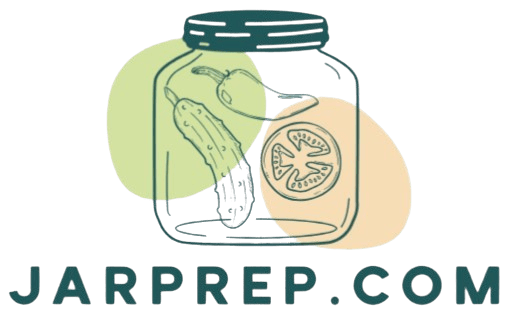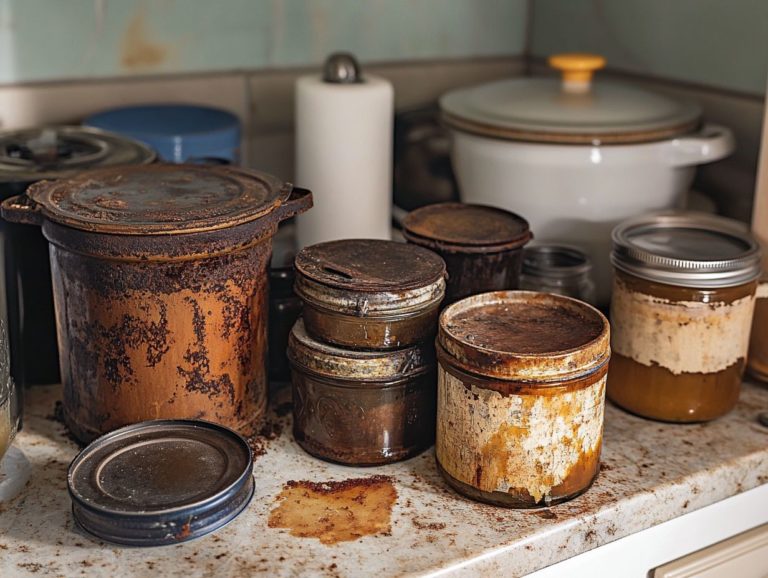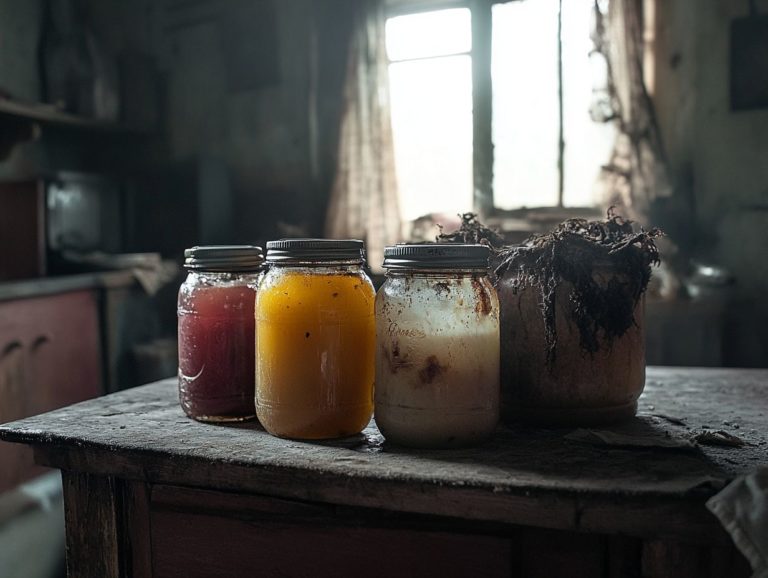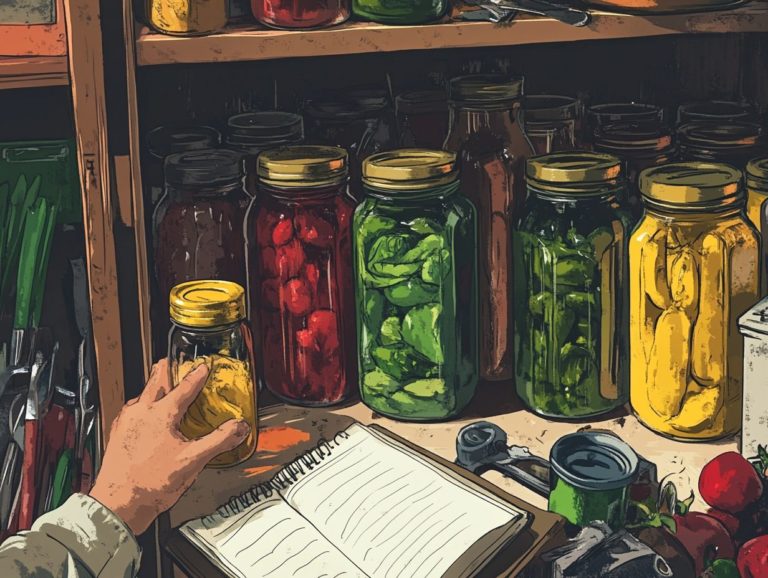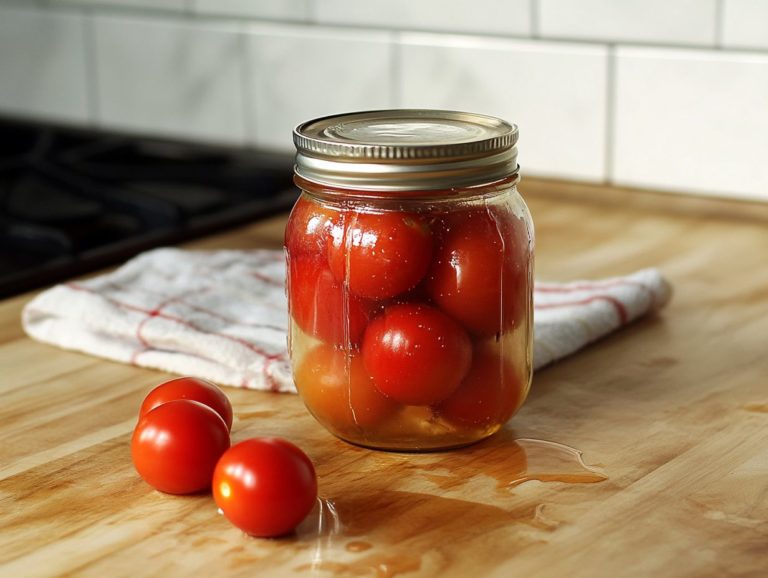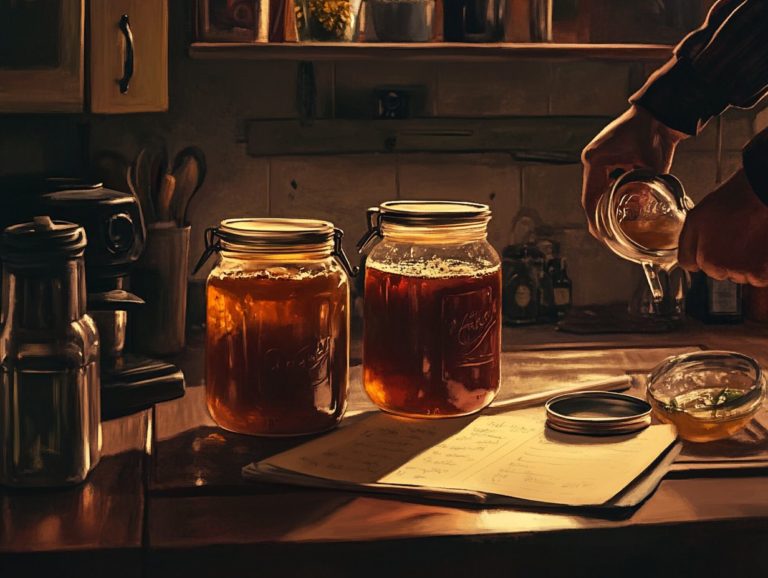Preventing Spoilage in Your Canned Goods
Food spoilage is a pressing concern for anyone who delights in preserving their harvest or stocking up on pantry staples. Understanding food safety in the storage and consumption of canned foods is crucial!
By learning about the causes and types of spoilage, including the role of tiny living things that can cause food to spoil, you can effectively safeguard your food. Mastering proper canning techniques whether through commercial canning or home canning methods is vital for ensuring both safety and longevity. Adopting best practices for storage significantly reduces the risk of spoilage.
Familiarize yourself with the signs of spoiled canned goods. Explore safe alternatives to canning that will keep your food fresh and delicious, such as vacuum sealing and other food preservation methods.
Contents
Key Takeaways:
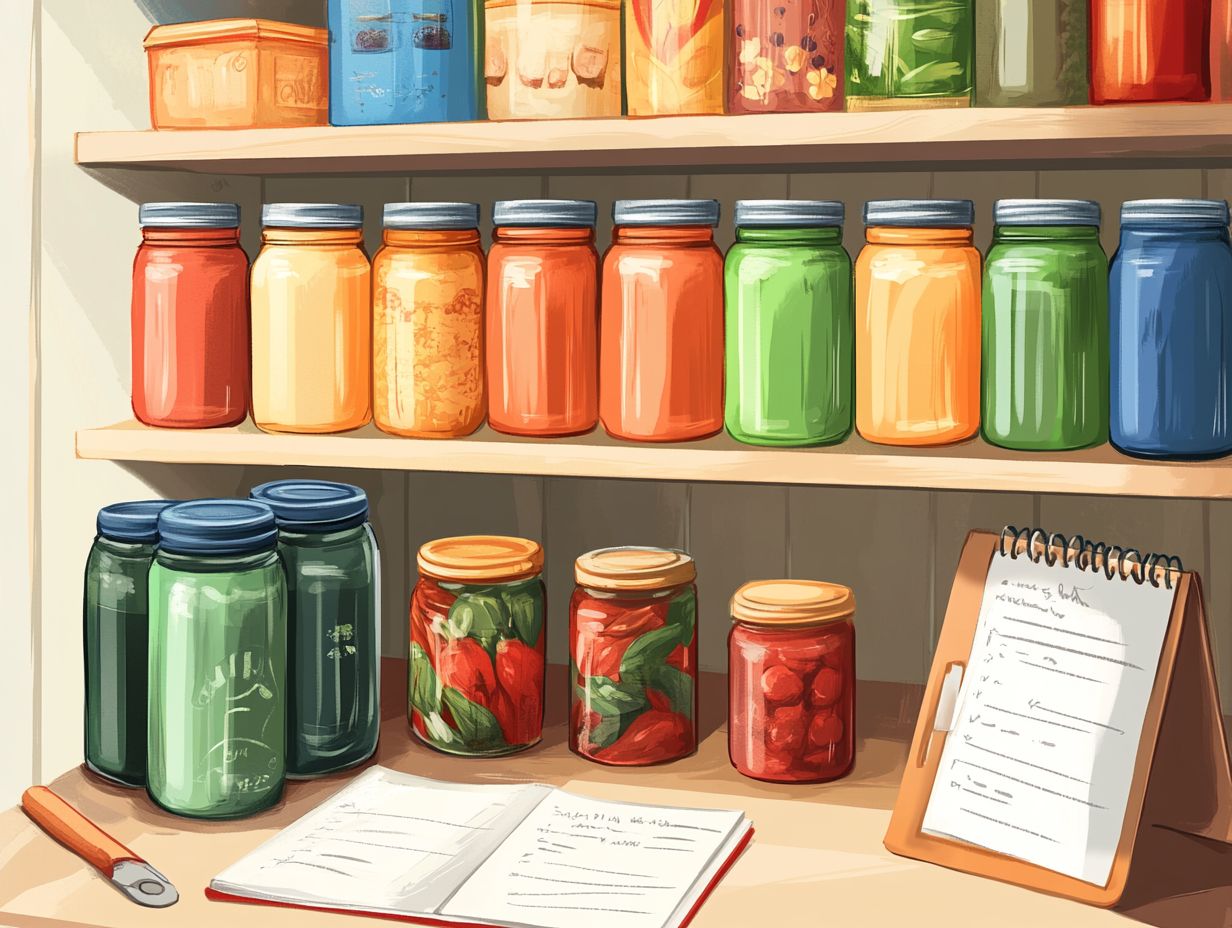
- Store canned goods properly to maximize their shelf life.
- Know the signs of spoilage: off smells, unusual colors, and textures.
- Always check labels and discard any cans showing spoilage signs.
What is Food Spoilage?
Grasping the nuances of food spoilage is essential for upholding food safety and preserving the nutritional value of your meals. Food spoilage refers to the decline in food quality, influenced by factors like microorganisms, improper handling, and unsuitable storage conditions. Proper food labeling and inspection practices help to mitigate these risks.
When food spoils, it not only loses its dietary benefits but can also become a haven for harmful microorganisms like botulinum, which can lead to foodborne illnesses. Recognizing the causes and indicators of spoilage, such as spoilage signs and food contamination risks, is crucial for anyone engaged in food preparation, whether in your kitchen or within the broader food manufacturing landscape.
Causes and Types of Spoilage
The causes and types of food spoilage can vary significantly, largely influenced by the ingredients and the environmental conditions in which they are stored.
Microbial spoilage occurs when bacteria, molds, and yeasts break down food. Look for signs like off odors, discoloration, and slimy textures. For example, mold can proliferate rapidly in a humid environment, often due to poor packaging and storage practices, turning your loaf of bread into a science experiment!
Chemical spoilage arises from oxidation, especially when fats and oils are improperly canned or stored. You can easily spot physical spoilage through bruising in fruits, making them less appealing and enjoyable.
Some microorganisms, like Salmonella in poultry and E. coli in beef, pose serious health risks. Understanding proper storage practices and adhering to food safety regulations is essential to prevent contamination.
Importance of Proper Canning Techniques
Proper canning techniques are paramount in both commercial and home canning practices. They are essential for food preservation and safety. By employing safe canning methods, whether commercial or home-based, you actively prevent food spoilage and ensure your canned goods maintain their quality over time.
Techniques like vacuum sealing and pressure canning effectively eliminate harmful microorganisms, significantly reducing the risk of foodborne illnesses. Understanding the nuances of boiling water canners and pressure canners is vital for anyone eager to preserve food safely and efficiently, following recommended storage and food safety practices.
Start preserving your food safely today for a healthier tomorrow!
Factors Affecting Canning Safety
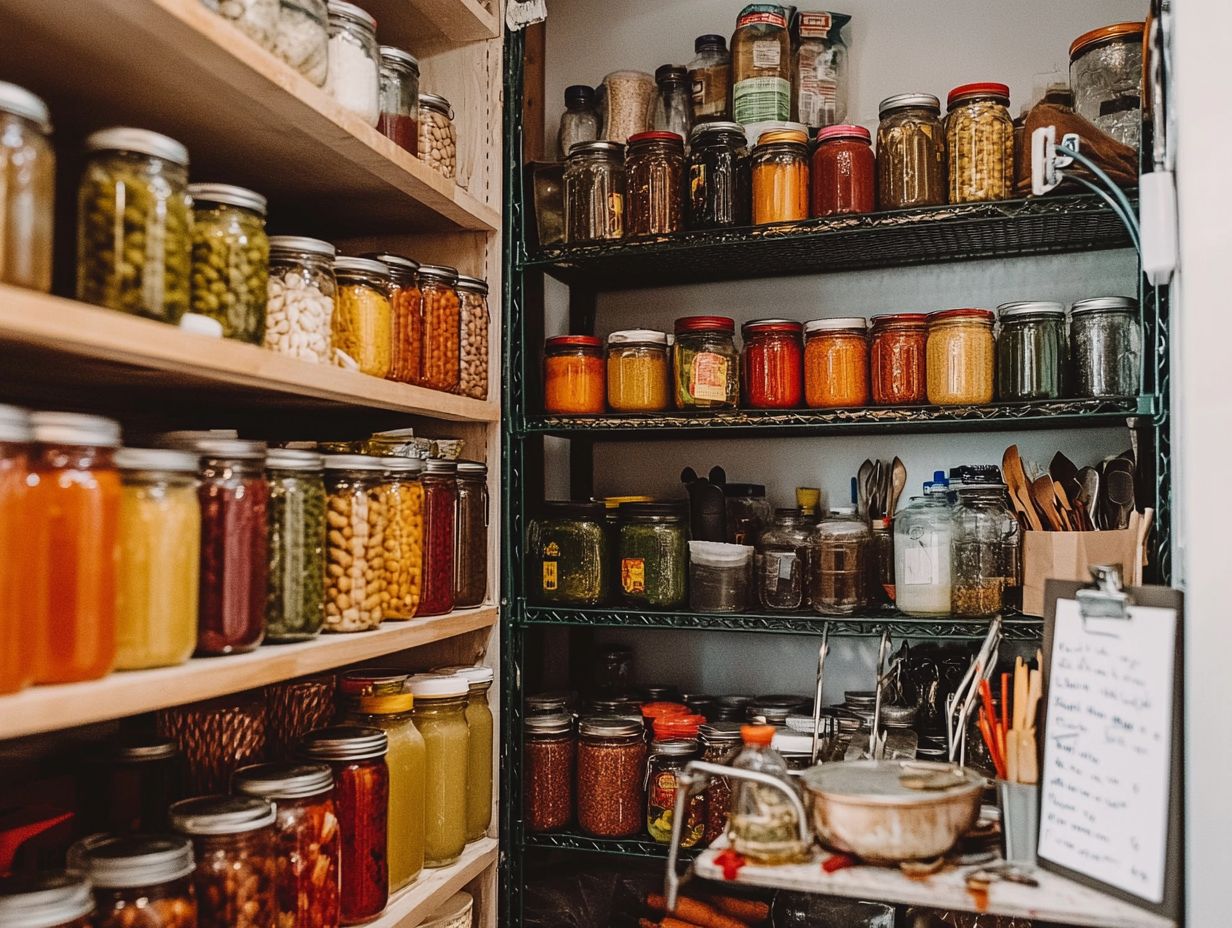
Several factors influence your canning safety. The acidity level of the food is paramount, especially when dealing with high-acid and low-acid foods. Foods are categorized as either high-acid or low-acid. This distinction is key for proper canning techniques and food safety.
High-acid foods like fruits, tomatoes, and pickles generally require a shorter processing time during canning. This is crucial for maintaining their quality and nutritional value. In contrast, low-acid foods such as vegetables, meats, and poultry demand a longer processing period to ensure safety. Improper handling can contribute to spoilage, which is critical, as insufficient processing can lead to spoilage and foodborne illness. Following dietary guidelines and safe food practices is essential. Properly sealing jars safeguards the contents from external contaminants, preventing food contamination and ensuring quality control.
Using the right jar lids is essential. They are crafted to create an airtight seal that keeps your jars secure during storage. This significantly reduces the risk of spoilage and oxidation, thus extending shelf life.
Preventing Spoilage in Canned Goods
To effectively prevent spoilage in canned goods, it’s essential to adhere to best practices for food storage and handling. Following tips for safe canning practices and using airtight containers will guarantee both quality and safety. This allows you to enjoy your preserved foods with confidence, as long as you monitor the best before date.
Best Practices for Storage and Handling
Storing and handling canned goods properly is crucial for avoiding spoilage. To ensure your food remains safe, especially regarding food labeling and inspection, refer to key tips on the canning process.
To maintain the quality and longevity of your canned goods, consider using airtight containers. This simple step greatly reduces exposure to air and moisture, which are the main offenders when it comes to spoilage. Regularly check the shelf life of your canned items. Always keep an eye on expiration dates and store them in a cool, dry place to preserve their contents, following the first in, first out method.
Be vigilant for signs of spoilage like bulging lids or unusual odors. Spotting these can help you avoid potential food-related illnesses due to poor food preparation and handling practices. Implementing proper food preparation techniques, such as maintaining a clean workspace and using uncontaminated utensils, can extend the shelf life of these essentials. This ensures your meals are both safe and enjoyable, especially when cooking with quality foods.
Signs of Spoiled Canned Goods
Spotting spoiled canned goods is crucial to keeping your kitchen safe and your meals delicious! Recognizing the signs helps prevent food contamination and protects you from harmful microorganisms, such as botulinum bacteria.
Identifying and Discarding Spoiled Food
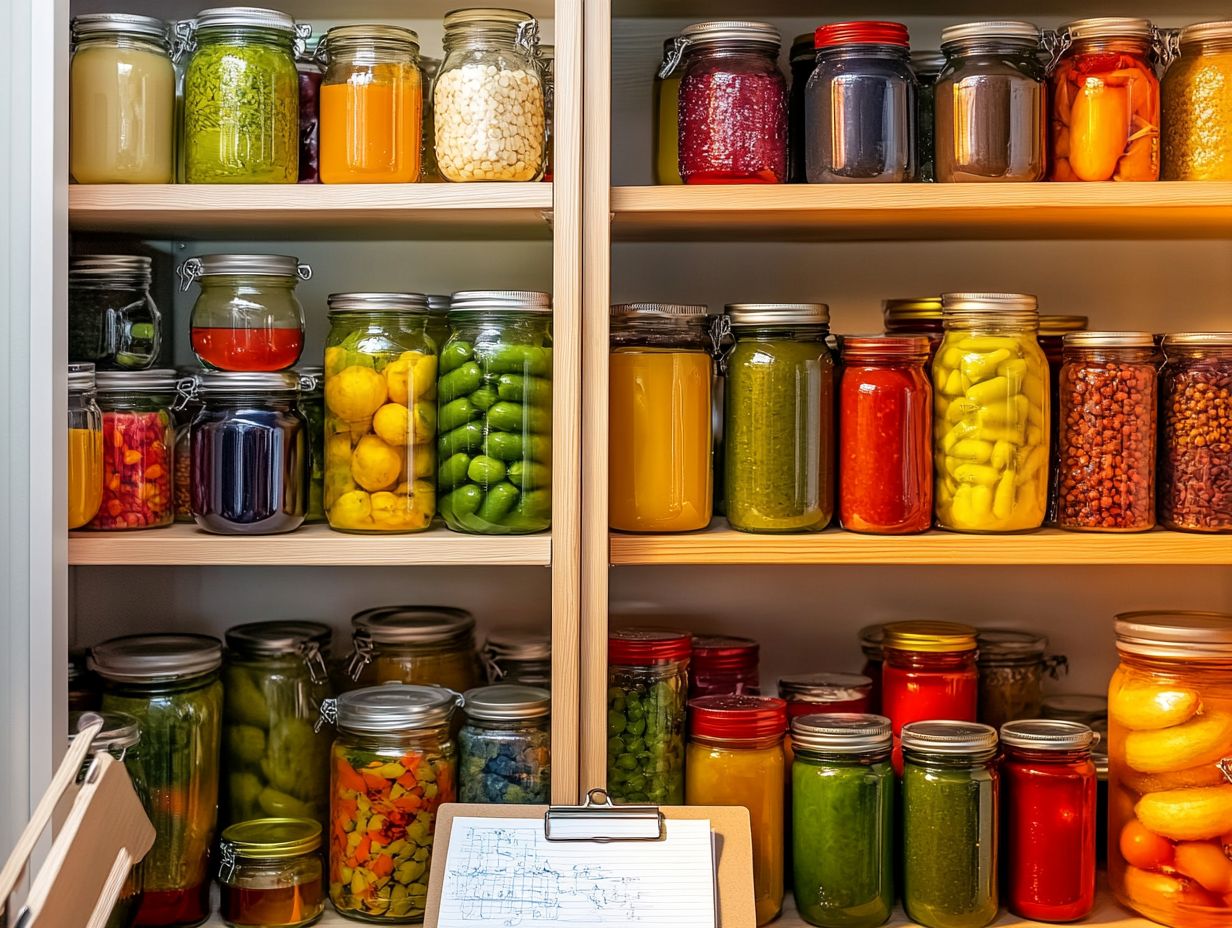
Identifying and discarding spoiled food is essential for maintaining food safety and health. This includes understanding food labeling and expiry practices. Not only does it help you avoid foodborne illnesses, but it also plays a crucial role in protecting your family from potentially harmful bacteria. This includes the notorious botulinum toxin, which can thrive in improperly canned foods.
This toxin, produced by the Clostridium botulinum bacteria, can thrive in improperly stored or canned foods. Be vigilant for signs of spoilage, such as off odors, discoloration, or a bulging can. Each of these signals should prompt you to act swiftly to protect your health and ensure food safety.
If you spot something questionable, dispose of it immediately to protect your health! Seal any questionable items in a plastic bag to prevent accidental consumption. Adhering to food safety regulations and guidelines regarding food storage can significantly reduce the risk of contamination. This ensures the well-being of everyone in your household, particularly with respect to packaging and food labeling.
Follow these tips to enjoy your canned goods safely and confidently!
Safe Alternatives to Canning
Exploring safe alternatives to canning, such as freezing or drying, offers you a wealth of options for food preservation that not only maintain nutritional value but also cater to your dietary needs.
Other Methods of Food Preservation
Other methods of food preservation encompass techniques like freezing, drying, and fermenting, each offering distinct advantages and applications, thus enhancing your cooking methods.
Freezing is a powerful method for preserving fruits and vegetables. It stops spoilage by halting natural processes that cause spoilage, particularly in high-quality ingredients.
Drying removes moisture to stop bacteria growth, making it ideal for herbs, meats, and certain fruits like apples and apricots. This process intensifies flavors beautifully and aids in food preservation.
Fermenting introduces beneficial microorganisms that enhance both taste and shelf life of foods such as yogurt, kimchi, and sauerkraut, contributing to their nutritional value. By understanding these methods, you help prevent food waste and ensure your food retains its quality and safety, making these techniques invaluable in modern food preservation.
Frequently Asked Questions
What causes spoilage in canned goods?
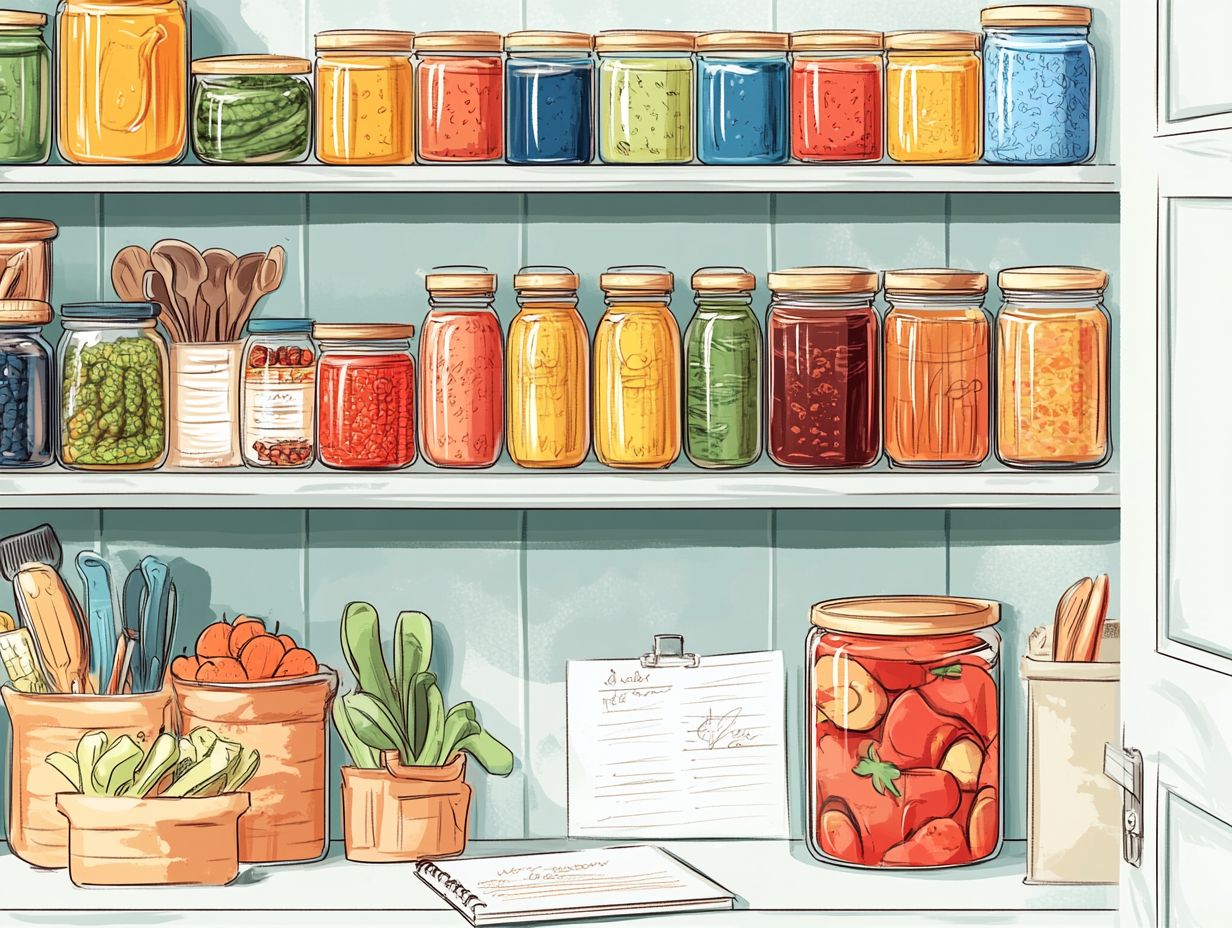
Spoilage in canned goods is typically caused by bacteria growth, which can occur if the can is not sealed properly or if the food inside was not cooked at a high enough temperature to kill any bacteria.
How can I prevent spoilage in my canned goods?
To prevent spoilage, it is important to properly sterilize your cans and equipment before canning. Use fresh, high-quality ingredients, and ensure the cans are sealed tightly and stored in a cool, dry place. If you encounter any issues, knowing what to do when your canned food spoils can also be helpful. Always check food labels for expiration dates.
What are some signs that canned goods have spoiled?
Spoiled canned goods may have visible signs such as bulging or dented cans, foul odors, or mold growth. These indicate the need for careful inspection and adherence to best practices for food safety. Discoloration or unusual texture are also clear signs of spoilage that warrant immediate disposal. If you notice any of these signs, it s best to discard the can and its contents, following proper food labeling and disposal practices.
Can canned goods still spoil if they are expired?
While canned goods may still be safe to consume after their expiration date, it is not recommended as the quality and taste may have deteriorated. Always check the expiration date and consume canned goods within a reasonable timeframe to maintain their quality and safety.
What is the best way to store canned goods to prevent spoilage?
To prevent spoilage, canned goods should be stored in a cool, dry place away from direct sunlight. Make sure to rotate your canned goods, using older cans first, and avoid areas with high humidity or fluctuating temperatures.
Can I still eat canned foods that have been frozen?
Frozen canned goods can be safe to eat, but the quality may be compromised. Freezing can cause cans to expand and potentially damage the seal, leading to spoilage. It’s best to use canned goods before freezing them to maintain their quality.
Don t wait! Preserve your food safely today!
